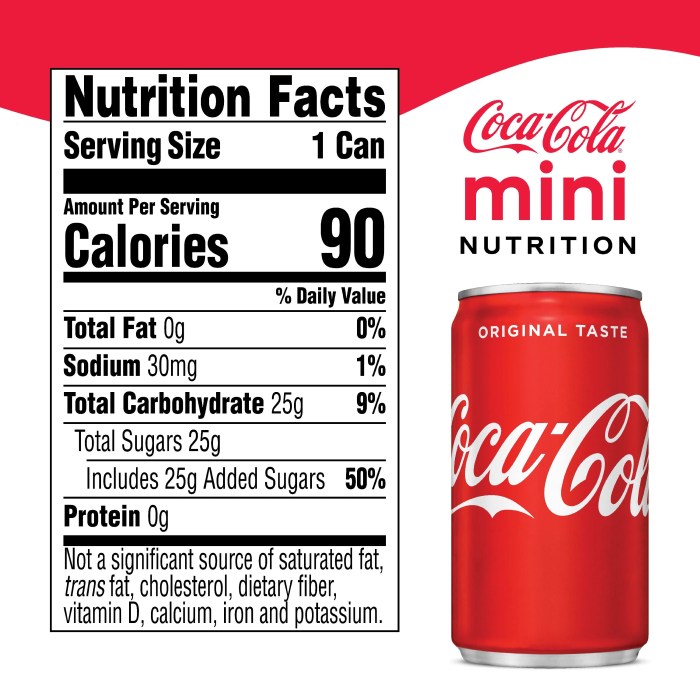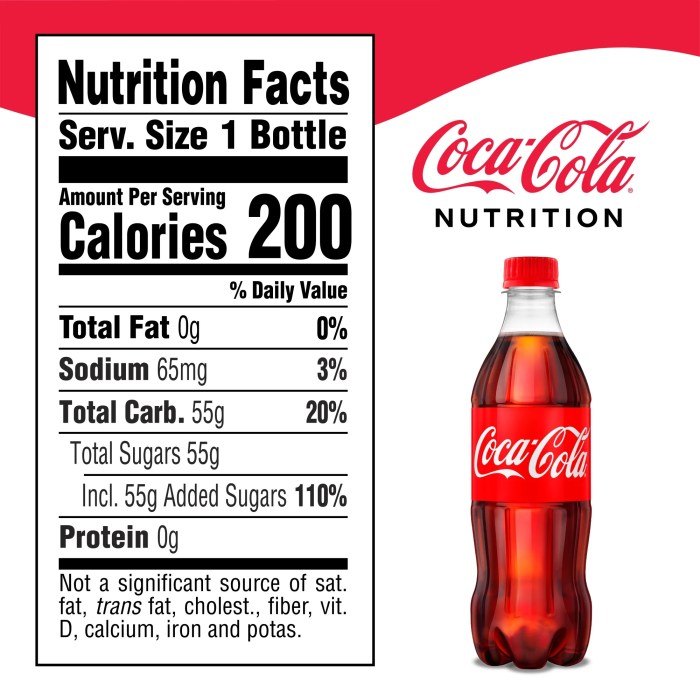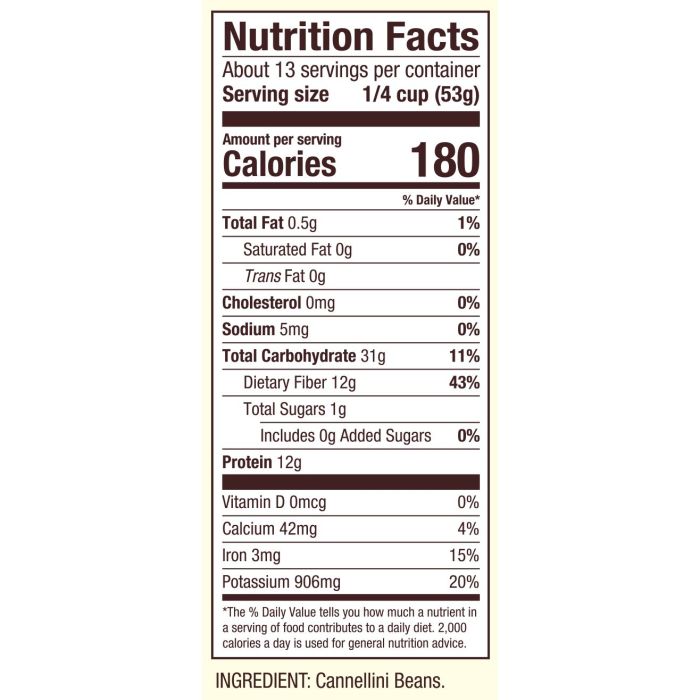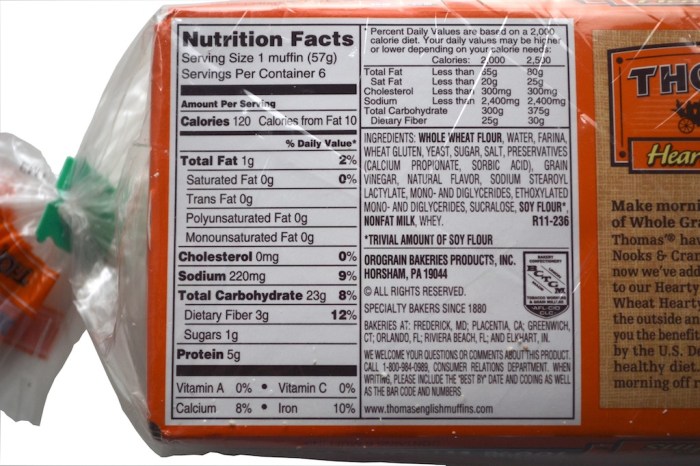Analyzing Sugar Content in Coca-Cola: Nutrition Facts Label Of Coca Cola

Nutrition facts label of coca cola – Coca-Cola, a globally recognized beverage, contains a significant amount of sugar, contributing to its characteristic sweet taste. Understanding the sugar content and its potential health implications is crucial for informed consumer choices. This section details the sugar content in a standard serving of Coca-Cola, compares it to other popular soft drinks, and explores the associated health risks.
Sugar Content in a Standard Serving
A standard 12-ounce (355ml) serving of Coca-Cola contains approximately 39 grams of sugar. This translates to roughly 10 teaspoons of sugar. This significant amount of added sugar should be considered within the context of daily recommended intake.
Comparison to Other Soft Drinks
The sugar content in Coca-Cola is comparable to many other popular soft drinks. Many other colas and sodas contain similar amounts of sugar per serving. However, some diet versions of these drinks utilize artificial sweeteners instead of sugar. It’s important to note that the sugar content can vary slightly depending on the specific product and serving size.
Always refer to the nutrition label for the most accurate information.
Health Implications of High Sugar Consumption
Consuming high levels of sugar from beverages like Coca-Cola is linked to several health concerns. Excessive sugar intake is associated with weight gain, type 2 diabetes, heart disease, and dental problems. The high fructose corn syrup often used in these drinks is particularly implicated in these health issues. Regular consumption of sugar-sweetened beverages contributes to increased caloric intake without providing essential nutrients.
Visual Representation of Sugar Content
Imagine a large glass representing the recommended daily sugar intake. This glass would be partially filled, perhaps to the halfway point, with a dark brown liquid to represent the sugar in one 12-ounce can of Coca-Cola. The remaining empty space vividly illustrates the significant portion of your daily sugar allowance consumed by a single serving. A second, smaller glass, representing the sugar in a single serving of Coca-Cola, would be almost completely full.
This visual comparison emphasizes the substantial sugar content relative to recommended daily intake.
Exploring Other Nutritional Aspects of Coca-Cola
Coca-Cola, beyond its well-known sugar content, contains a blend of other ingredients that contribute to its flavor and overall nutritional profile. Understanding these components is crucial for a comprehensive assessment of its impact on health. This section delves into the specifics of these ingredients and their potential effects.
Key Ingredients and Their Potential Health Effects
Coca-Cola’s primary ingredients, aside from sugar and water, include phosphoric acid, caramel color, caffeine, and natural flavors. Phosphoric acid contributes to the drink’s tartness and acts as a preservative. High consumption of phosphoric acid has been linked to potential bone density issues in some studies. Caramel color, while generally considered safe, is a complex mixture and some studies have raised concerns about potential long-term health implications from certain types of caramel coloring.
Caffeine, a stimulant, can impact the nervous system, leading to increased alertness and heart rate, while also potentially contributing to insomnia or anxiety in sensitive individuals. The “natural flavors” are a proprietary blend, and their specific composition and potential health effects remain less transparent. It’s important to note that the overall impact of these ingredients is often dependent on individual factors and consumption levels.
Artificial Sweeteners and Additives in Coca-Cola
Diet and zero-sugar versions of Coca-Cola utilize artificial sweeteners to replace sugar. Common artificial sweeteners include aspartame, acesulfame potassium, and sucralose. While generally considered safe within acceptable daily intake levels, some individuals report experiencing digestive discomfort or other side effects from these sweeteners. Additionally, Coca-Cola and its variants may contain other additives, such as preservatives and flavor enhancers, which contribute to the overall product characteristics.
The long-term effects of these additives on health remain a subject of ongoing research and debate.
Understanding the nutrition facts label on a Coca-Cola can is crucial for mindful consumption. It highlights the significant sugar content, often prompting comparisons with other high-calorie meals. For instance, checking the big mac meal nutrition facts offers a contrasting perspective on caloric intake and macronutrient distribution. Returning to the Coca-Cola label, remember to consider the overall impact of sugary drinks on your daily nutritional balance.
The Role of Carbonation and its Potential Impact
Coca-Cola’s carbonation, achieved by dissolving carbon dioxide gas in the liquid, contributes significantly to its distinctive fizzy texture and taste. However, the rapid release of carbon dioxide gas can lead to bloating and gas in some individuals. Excessive consumption of carbonated beverages may also contribute to dental erosion due to the acidity of the drink. Furthermore, the carbonation itself doesn’t directly provide any nutritional value.
Nutritional Comparison: Regular vs. Diet/Zero-Sugar Coca-Cola, Nutrition facts label of coca cola
The following table compares the nutritional content of regular Coca-Cola with its diet and zero-sugar counterparts. Note that exact values can vary slightly depending on the specific product and serving size.
| Nutrient | Regular Coca-Cola | Diet Coca-Cola | Coca-Cola Zero Sugar |
|---|---|---|---|
| Calories | ~140 | ~0 | ~0 |
| Total Sugar (g) | ~39 | ~0 | ~0 |
| Total Carbohydrate (g) | ~39 | ~0 | ~0 |
| Protein (g) | 0 | 0 | 0 |
| Fat (g) | 0 | 0 | 0 |
| Caffeine (mg) | ~34 | ~34 | ~34 |
Comparing Coca-Cola to Other Beverages

Choosing a beverage often involves a trade-off between taste and health. While Coca-Cola offers a familiar and appealing taste, understanding its nutritional profile in comparison to healthier alternatives is crucial for making informed choices. This section will analyze Coca-Cola’s nutritional content alongside water, juice, and other non-carbonated drinks, highlighting the advantages and disadvantages of each.
Nutritional Comparison of Beverages
The following table provides a direct comparison of the nutritional information of a 12-ounce serving of Coca-Cola with three other common beverage choices: water, orange juice, and a diet soda. Note that values may vary slightly depending on the brand and specific product. This table uses average values from reputable sources.
| Beverage | Calories | Sugar (grams) | Sodium (mg) |
|---|---|---|---|
| Coca-Cola (12 oz) | 140 | 39 | 15 |
| Water (12 oz) | 0 | 0 | 0 |
| Orange Juice (12 oz) | 110-120 | 21-26 | 1-2 |
| Diet Soda (12 oz) | 0-5 | 0-1 | <10 |
Advantages and Disadvantages of Coca-Cola Consumption
Coca-Cola’s primary advantage lies in its taste and widespread availability. It provides a quick source of energy due to its sugar content, although this is a significant drawback. The high sugar content contributes to weight gain, increased risk of type 2 diabetes, and dental problems. Conversely, water offers essential hydration with zero calories and no added sugars. Orange juice provides vitamins and antioxidants but can be high in natural sugars.
Diet sodas offer a low-calorie, low-sugar alternative, but some artificial sweeteners may raise concerns for some individuals. The choice depends on individual health goals and preferences, balancing the desire for enjoyment with the need for nutritional well-being.
Query Resolution
What are the potential long-term health effects of regular Coca-Cola consumption?
Regular consumption of Coca-Cola, due to its high sugar content, can increase the risk of weight gain, type 2 diabetes, heart disease, and tooth decay. These risks are amplified with excessive intake.
Does Coca-Cola contain any artificial sweeteners?
Diet and zero-sugar versions of Coca-Cola utilize artificial sweeteners to reduce or eliminate sugar content. The specific artificial sweeteners used vary by region and may include aspartame, acesulfame potassium, or sucralose.
How does the carbonation in Coca-Cola affect the body?
Carbonation can lead to temporary bloating and increased gas. Excessive consumption may also erode tooth enamel due to the acidity of the drink.
Are there any nutritional benefits to Coca-Cola?
Coca-Cola offers minimal nutritional value. It primarily provides calories from sugar and lacks essential vitamins and minerals found in other beverages.








